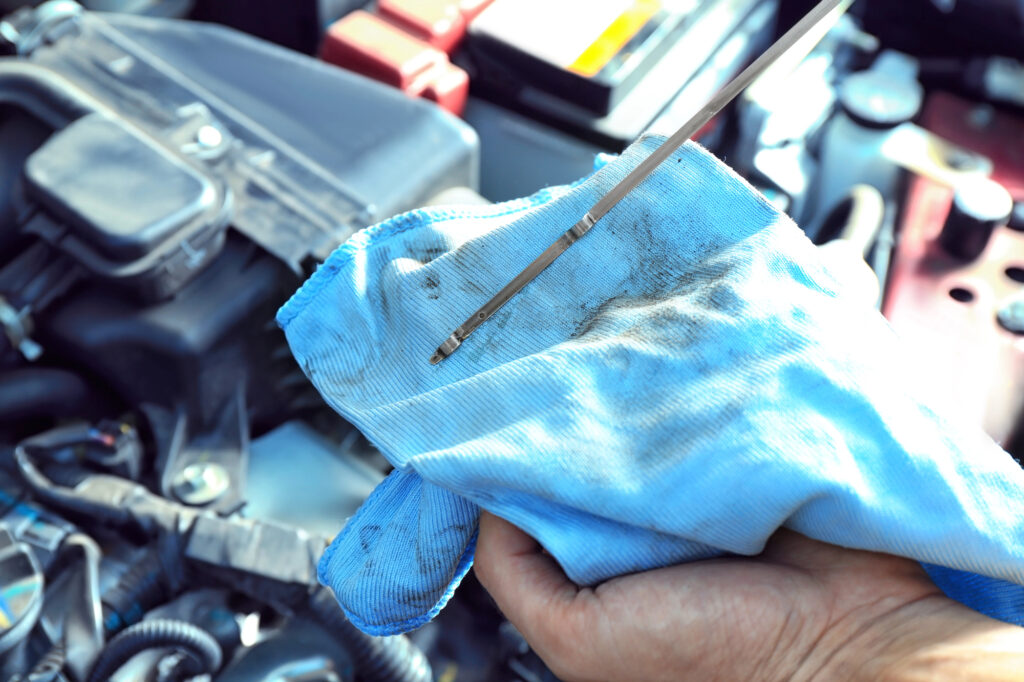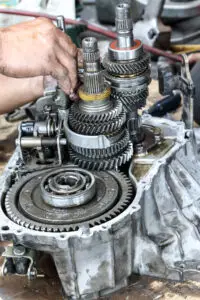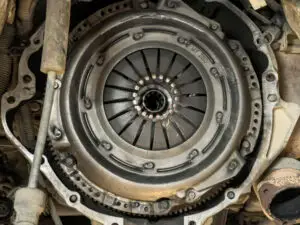Has your daily drive gotten louder? New noises from under the hood could point to transmission trouble that needs to be addressed. Luckily, there are ways to help understand what may be happening within your transmission, depending on the sounds you hear and other symptoms from your car. Grinding, whining, clunking, and gurgling can all be alarming to hear—and for good reason. But when you follow the right steps, you can help prevent more serious transmission issues.
Do You Drive a Manual or an Automatic Transmission Car?
Depending on which type of vehicle you drive, the transmission operates differently—and noises may indicate different problems. Overall, manual transmissions are much more mechanical and have a clutch that facilitates each gear shift. On the other hand, automatic transmissions rely more on hydraulic power from fluid circulation, paired with electronic input from sensors and control units. While both can make similar sounds when there’s an issue, some are more common than others for each type of transmission—and the necessary repairs can also differ.
Which Noises Do You Hear from Your Transmission?
The first step in addressing transmission noise issues is to understand what you’re hearing—and what each sound may signal. Each common noise can point to several possible transmission problems, but that still means you can get an idea of which repairs or services your car may need.
Grinding
If you drive a manual transmission vehicle, you’re likely familiar with this sound, since it can often happen due to user error. When you mistime the engagement and release of the clutch while shifting gears, you’ll likely hear a harsh grinding sound and experience a sudden loss of power. This is due to metal components hitting one another—and it can happen in automatic transmission cars, too, if the torque converter is faulty or fluid is low.
Whining or Whirring
You may expect whining to come from a loose belt—but it could also point to your transmission. It may come down to issues as simple as a clogged filter or fluid lines. If heard mainly while your car is speeding up, it could mean there’s a problem with the acceleration gear. Especially in automatic transmissions, a whining sound could also indicate low transmission fluid, which can quickly lead to more extensive damage.
Clunking
When it comes to transmission noises that are hard to ignore, clunking may be near the top of the list. In particular, it could mean that fluid level is too low, allowing components to collide without adequate lubrication. You may also have damaged gears or loose transmission mounts, which can allow the entire system to move as you drive. Finally, incorrectly shifting a manual transmission or an automatic that receives incorrect information from speed sensors could also cause a clunking sound.
Gurgling
One of the more straightforward transmission sounds, gurgling most often indicates low fluid levels or air trapped in the lines. Either can lead to wear or damage within the transmission, so it’s important not to ignore this noise. Luckily, routine maintenance to replace transmission fluid and inspect the system for leaks will typically get you quickly back on the road again—noise-free.
 Next Steps to Prevent Further Damage with Transmission Noises
Next Steps to Prevent Further Damage with Transmission Noises
As soon as you hear strange sounds from your vehicle that may be coming from the transmission, there are a few steps to take that can prevent the issue from escalating. At home, you can check the fluid level in your transmission and see if the system’s filter needs to be replaced. From there, it’s time to consider which maintenance, inspections, or repairs you may need to schedule.
Check the Level & Condition of Your Transmission Fluid
Most newer vehicles have a dipstick you can use to check the level and condition of transmission fluid. Almost any new noises from your transmission could be caused by issues related to low fluid—and though that can make them simpler to fix, they can still lead to serious damage over time. If the transmission fluid level in your car is low or it seems overly thickened, you’ve likely found the source of your problems.
Replace Filters in or Associated with the Transmission
Like many systems in your car, the transmission has a filter to help prevent the circulation of contaminants. Over time, it can become clogged with dirt and other contaminants, eventually inhibiting the flow of fluid enough to cause strange sounds and other symptoms of transmission trouble. If dirty, these filters need to be cleaned or replaced to restore efficient operation.
Carry Out Any Overdue Maintenance Services
Has it been a few years since a professional mechanic last inspected your transmission? Can’t remember the last time your transmission fluid was changed? If you’re overdue for any routine maintenance, it may be contributing to the new noises from your transmission. Consider scheduling these services with a trusted mechanic as soon as possible.
Have a Professional Mechanic Inspect Your Transmission
When your at-home diagnostic steps lead to more questions, it’s time to bring your vehicle to a professional mechanic. With the right tools and understanding of the system’s operation, it shouldn’t take long to figure out what the issue is with your car’s transmission and handle necessary repairs or services to get you back on the road again.
Enjoy a Smooth, Silent Transmission Again By Visiting AAMCO
Nip transmission trouble in the bud. As soon as you hear new noises or notice other symptoms that point to a necessary transmission repair, it’s time to trust the expert mechanics at your local AAMCO. We understand the ins and outs of how your transmission operates, which services it may need, and how to handle any repairs efficiently and thoroughly. Schedule your appointment with us today and find out why we’re a trusted name in transmission care.






